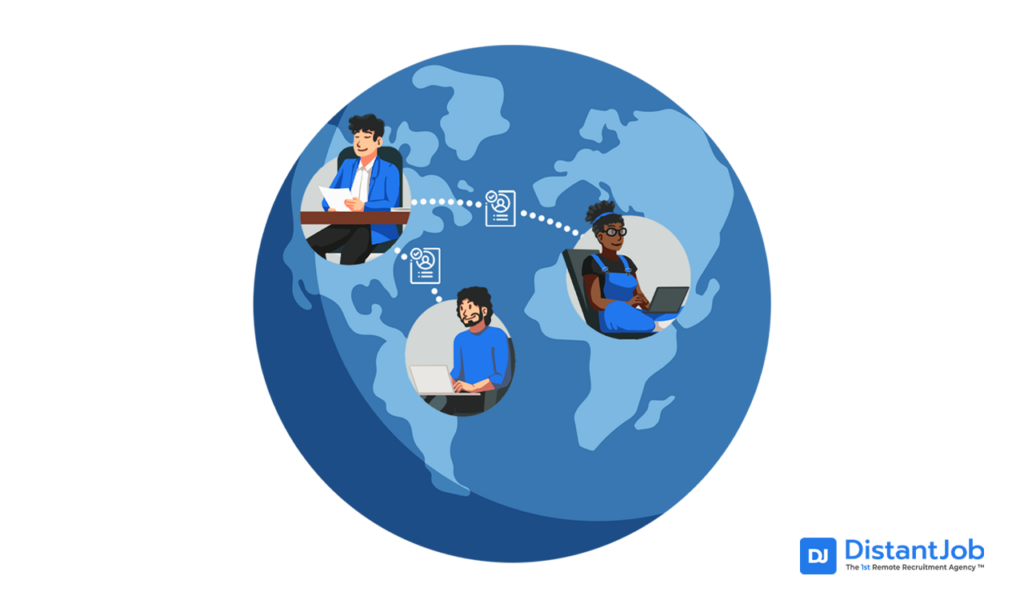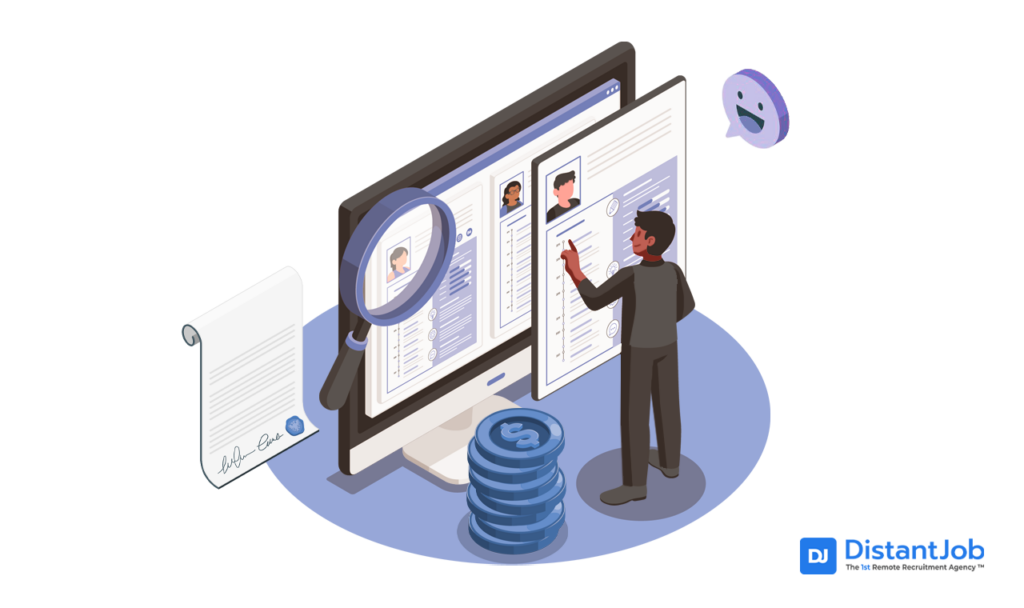If you’re planning to set up a global remote workforce for developers, IT specialists or any other professionals, you must take into account employment regulations and labor laws..
Labor laws for remote workers protect and guarantee everyone who works outside the traditional workplace the same treatment as any in-office employee. For a company, non-compliance to these laws can potentially lead to lawsuits or reputational damage.
It may also culminate into employee dissatisfaction, decreased productivity, and increased employee turnover rates.
In this article, we cover everything you need to know about labor regulations for remote workers, ranging from the key labor laws for remote employees, labor laws compliance strategies for employers, plus how to leverage EOR Services to comply with employment regulations.
Let’s dive in!
Understanding Labor Laws

All labor relationships across different regions in the world are governed by clearly defined labor laws and relevant employment regulations. These laws also apply to remote employees as they are subject to the same state laws regarding wages, overtime, breaks, and paid leaves.
If you’re an employer based in a different country or region, your workers’ rights are mostly determined by the labor laws in their jurisdictions. Complications only arise if your remote workers are required to travel and work from various destinations.
Before hiring for a remote role, it’s crucial for employers to acquaint themselves with labor laws across different countries and regions, and how they work.Employers should also learn about the importance of equal treatment for employees, whether remote or not.
Remote employees should enjoy the same rights and protections as in-office employees. As long as the remote workers are professional and comply with internal company policies, they’re entitled to the same federal and state laws regarding wages, overtime, breaks, and paid time off.
Labor Laws in Europe
The European Union has employment laws set to protect the rights of workers working across the region. Within these labor laws, some only apply to specific countries. This is why some employment regulations may often operate differently in member states.
Some of the key employment laws across various EU countries include:
- Labor laws in France provide for employees to work 35 hours a week. The laws view overtime as extra hours that must be requested by the employee‘s superior.
- Switzerland is employer-friendly, as seen in the case where an employer may terminate an employment contract for any reason. However, an employee still retains a statutory right to demand a reason for their dismissal in writing.
In the UK, the National Minimum Wage Act 1998 sets a minimum wage where as of 1 April 2024, people aged 21 and over are entitled to the minimum wage of £11.44.
Labor Laws in the US
The US has some of the most progressive labor laws in the world, albeit some differ from state to state. The Fair Labor Standards Act (FLSA) is one of the most important labor laws in the US that directly affects remote workers. Remote workers must comply with the act and other relevant employment laws depending on where they are located.
Key Labor Laws for Remote Workers

Several labor laws protect the rights of remote employees, assuring any worker who works outside their jurisdiction a fair treatment. They ensure employers treat remote workers like any in-office employee, especially regarding the following:
1. Employment Contract
An employment contract is an agreement between an employer and employee regarding the terms and conditions of the employment. The contract is extended by the employer, outlining every aspect of the working relationship.
As per labor laws, employment contracts ought to be clearly crafted for both parties to understand their rights. For an employee, it assures them their rights to the agreed pay and working conditions.
On the other hand, employers can use the employment contract to manage their employee’s expectations of their new role. In a nutshell, it ensures the terms of the employment are compliant, protected and no party can take advantage of the other.
2. Worker Classification
Worker classification is the legal categorization of workers according to their employment status. There’s a legal criteria that defines how to classify workers, such as the degree of control the employer has over the worker, or level of financial risk assumed by the worker.
In most cases, worker classification can be used to distinguish between company employees and independent contractors. As labor laws states, employers are required to correctly classifying workers as it directly impacts their:
- Payroll processes
- Allocation of worker benefits
- Tax liabilities.
Failure to properly classify workers may culminate in legal tussles from misclassified parties, or financial penalties from the relevant tax authorities.
3. Minimum Wage and Overtime
Minimum wage is the amount an employer is supposed to pay their employees for the work performed during a given period. This amount is protected under the relevant labor laws and cannot be re-negotiated downwards by collective agreement or an individual contract
Labor laws across the world set provisions for minimum wages and overtime to protect workers against undeservedly low pay. Employers are always required to comply with minimum wage and set appropriate overtimes to avoid severe legal sanctions.
4. Health and Safety
Every employer should have precautions and policies that assure their remote employees a safer work environment. For example, a good policy for a remote workforce should include clear principles on employee health, safety guidelines, and rules on flexible working hours.
This can also extend to mental health support services for employees. Examples of health and safety policies, as a requirement for a safe remote working environment, include:
- Create designated time outside of work for employees to rest and recharge
- Implement flexible working hours that foster healthy work-life balance.
Compliance Strategies for Employers
Complying with labor laws can be challenging, especially when hiring a global remote workforce. You need to check every action you take on your employees to avoid any consequences of non-compliance in the jurisdiction your employees are working from.
Here are a few strategies you can employ to ensure compliance with labor laws.
1. Make an Employee Handbook
An employee handbook is an invaluable asset for maintaining and governing an employment relationship. You can create one that contains useful information about the employee’s rights and their remuneration.
An employee handbook can also contain remote work policies and safety standards your distributed teams are entitled to. With such an asset in your hands, it becomes easier to prevent legal disputes and formalize new company policies.
2. Legal Consultations
Work with labor law consultants who are well-versed with the local employment laws. They can help you mediate employment contracts and disputes with the employees. You can also work with them to come up with remote work safety protocols, conduct audits, and ensure compliance with relevant regulations.
3. Develop HR Policies and Procedures
Ensure that the policies and procedures that govern the ongoing employment relationship align with the relevant labor laws. Developing HR processes compliant with employment regulations will empower and protect employees and minimize business risks.
They also provide legal protection for the employer, a crucial factor to avoid legal disputes with employees and authorities.
Challenges in Navigating Labor Laws
Each region has a unique set of labor laws and employment regulations that make compliance a complex task. From cultural differences to multi-jurisdictional compliance, here are some of the key challenges in navigating labor laws.
1. Cultural Differences
Cultural norms and values that vary in different regions also contribute to influencing labor laws and remote work practices. This cultural diversity brings new challenges in managing and compliance of labor laws.
For example, the differences in attitudes, such as work-life balance and employee autonomy may differ widely in different cultural setups. Failing to take into consideration this cultural landscape may pose challenges, ranging from friction to low employee morale.
Hiring companies have a big role to play such as promoting high standards with cultural sensitivity training. On top of that, they should deeply consider local customs when shaping policies without losing brand continuity.
2. Multi-Jurisdictional Compliance
Managing labor laws compliance across multiple regions and countries can be an uphill task for employers with remote teams. It often requires a dedicated HR team that can continuously monitor legislative changes and regular labor policy reviews. Multi-jurisdictional compliance also calls for centralized HR systems and ongoing legal counsel to mitigate any compliance risks.
3. Staying Current with Labor Law Changes
One of the key challenges of labor laws for remote workers is staying well-informed of the latest changes, which can occur frequently. Failing to keep up with any of them can lead an employer down into the pits of legal non-compliance.
Employers must remain proactive and adaptable in learning new policies and integrating them accordingly. HR teams should also remain on the lookout for any labor law changes that can stem from court rulings or local regulatory updates.
Best Practices for Employers to Ensure Labor Law Compliance
Aside from keeping up with changes in labor laws and employment regulations, employers can also integrate the following best practices into company policies to ensure compliance with the relevant labor laws:
1. Training
Employee training is an effective way to ensure compliance with labor laws. You can create a culture where you train your remote employees about their rights and responsibilities. Training also allows you to teach your employees about company policies and procedures.
2. Audits and Review
Even with HR and good employment practices, you should never neglect the power of regular audits and reviews to ascertain the company’s labor law compliance. This is a crucial step that can seal any loopholes, especially if there are loose ends that could eventually result in non-compliance.
3. Transparent Communication
It’s always the duty of employers to implement open communication channels across their remote teams, and nurture a culture of close collaboration. This is crucial in fostering a unified company culture while respecting the underlying regional differences.
EOR Services and how they can help comply with Labor Laws

Working with an EOR service guarantees that you conform to specific local labor regulations. These are companies well versed with labor laws work in various jurisdictions, and can help you handle all employment operations while staying in touch with the local regulatory requirements.
Here’s how EOR service providers such as DistantJob help oversee your legal compliance in a remote work environment:
- We carry out comprehensive legal compliance review of employment practices and policies to ensure they align with local labor laws.
- We continuously monitor local labor laws, with prompt updates about employment policy or procedure changes.
- We also offer remote payroll management that’s accurate and efficient to minimize errors and discrepancies that could arise in employee payments.
Conclusion
Adhering to labor laws and regulations can be difficult, even with strict compliance protocols in place. Managing a remote workforce makes it even more difficult as you may be buried in an endless exercise of dealing with local government agencies and managing notices.
That’s why you need a dedicated compliance manager with the experience and knowledge to ensure labor law compliance.
At DistantJob, we not only excel as a top remote IT staffing agency, but we also help you maintain compliance with labor laws through our EOR services.
We have solutions that can help navigate labor law compliance challenges and a platform for effective labor law compliance management.
Contact us today to keep your remote teams engaged and well cared for!





